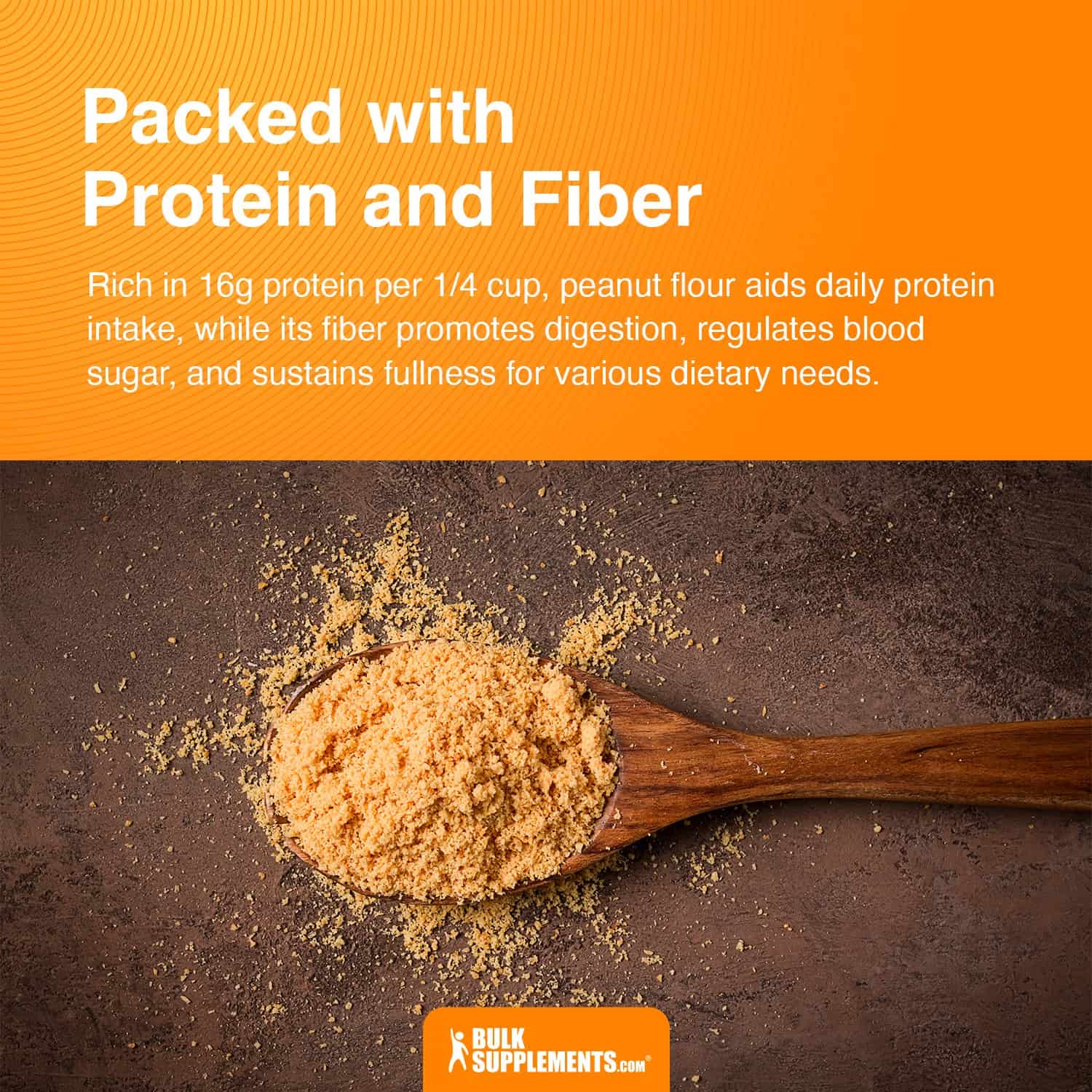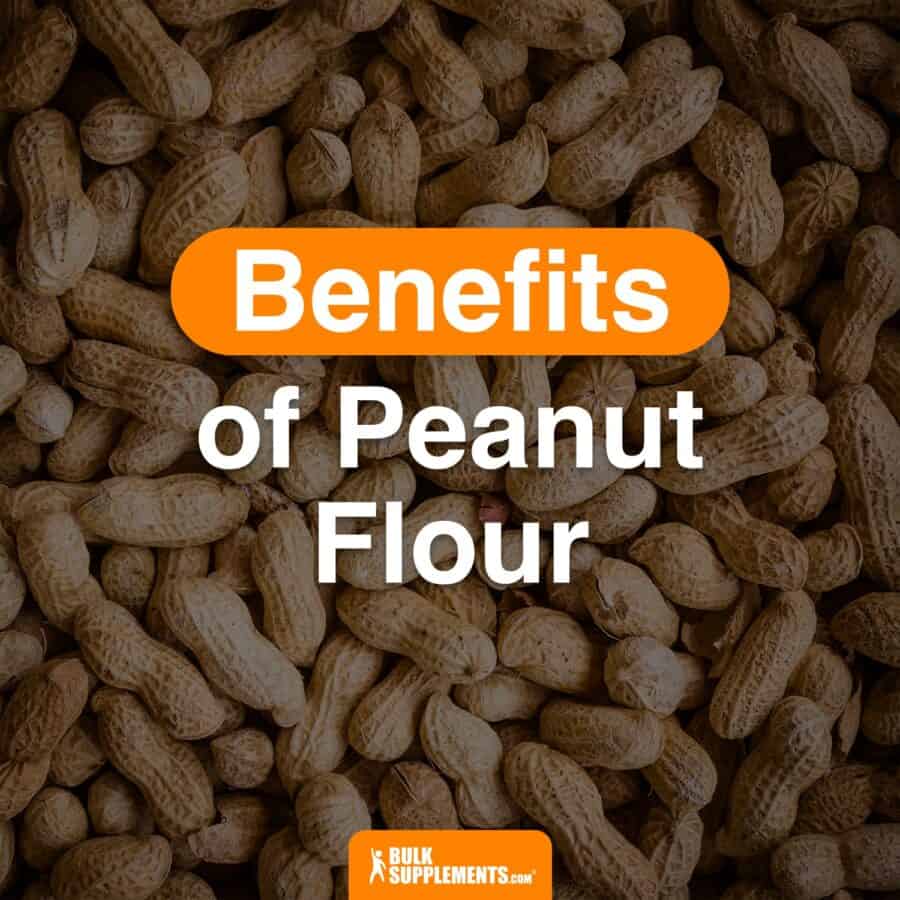Are you looking for a convenient way to get more protein into your diet without taking on extra calories? Peanut flour is the perfect choice. Not only does it offer an impressive 8 grams of high-quality protein per two tablespoons, but it also has some clever ways to sneak it into all of your favorite dishes! From smoothies and oatmeal to pancakes and muffins – peanut flour adds some delicious flavor while boosting that nutrient profile. Plus, you can rest assured knowing that this is a guilt-free healthy option you can enjoy every day!
What is Peanut Flour?
Peanut flour is made from ground up, de-fatted peanuts. The process involves removing nearly all the oil from the peanut so that the end result is very low in fat. This lowers the calorie count and makes it a more desirable food option for people trying to maintain a healthy lifestyle. Peanut flour is commonly used in baking, cooking, and as an ingredient in smoothies. It is also a popular choice for people who are allergic to whole peanuts.
It is made from roasted peanuts that have been ground into a fine powder. The flour can be used in a variety of recipes and is a great source of protein and healthy fats. It’s also gluten-free and low in carbohydrates, making it a great option for those with dietary restrictions.
What Are the Nutritional Benefits of Peanut Flour?
Peanut flour is packed with protein, fiber, and essential vitamins and minerals. Just one serving of peanut flour contains around 16 grams of protein, which is more than many other plant-based varieties like soy or pea protein. As an excellent source of dietary fiber, peanut flour helps keep you feeling fuller for longer periods of time. It is also rich in potassium, magnesium, and vitamin E, which are all essential for maintaining good health.
What is the Difference Between Peanut Powder and Peanut Flour?
Peanut powder is made by crushing roasted peanuts into a fine powder. Most peanut powders have had the oils removed from the peanuts, making them low in fat and calories. It often comes in sweetened or unsweetened versions, and can be used in a variety of recipes, including smoothies, baking, and cooking.
Peanut flour is made by pressing roasted peanuts to remove any excess oils and then grinding the nuts into a fine flour. Unlike peanut powder, peanut flour is not sweetened and has a stronger peanut flavor. It also typically has a slightly higher fat content than peanut powder, which makes it denser. It is perfect for baking and cooking, and it is an excellent source of protein and fiber.
Benefits of Peanut Flour
Packed with Protein and Fiber
One of the main advantages is its high protein content. With around 16 grams of protein per 1/4 cup serving, it’s a great way to boost your daily intake of this essential nutrient. Additionally, it is rich in fiber, which helps to promote healthy digestion, regulate blood sugar levels, and keep you feeling full and satisfied. Whether you’re an athlete, a vegetarian, or just looking to eat a healthier diet, it can be a valuable addition to your pantry.

Low in Fat and Calories
Another benefit is its low-fat and low-calorie content. Unlike traditional peanut butter, which is high in both fat and calories, it contains just 1.5 grams of fat and 70 calories per 1/4 cup serving. This makes it an excellent option for anyone looking to control their weight or reduce their overall calorie intake. Plus, with its rich, nutty flavor, it can provide all of the taste and texture of peanut butter without the added calories and fat.
Contains Essential Vitamins and Minerals
In addition to being a good source of protein and fiber, peanut flour is also rich in several key vitamins and minerals. For example, it contains significant amounts of vitamin E, manganese, and magnesium, all of which are important for maintaining good health. Vitamin E, in particular, is a powerful antioxidant that can help to protect your cells from damage caused by free radicals. By incorporating into your diet, you can help to ensure that your body gets all of the nutrients it needs to function at its best.
Control Blood Sugar Levels
Peanut flour is a low-glycemic-index food, which means it does not cause an immediate spike in blood sugar levels. This makes it perfect for diabetics and those struggling to keep their blood sugar levels in check. Meanwhile, its high protein and fiber content keep you feeling full for longer, preventing the urge for constant snacking throughout the day. Add it to your smoothies or replace some of the flour in your baked goods for better blood sugar control.

High in Plant-Based Protein
One of the most significant nutritional benefits is its high protein content. With up to 8 grams of protein per serving, it’s an excellent option for vegans, vegetarians, and anyone looking to boost their protein intake without meat. It contains all nine essential amino acids, making it a complete protein source that can help keep you feeling full and energized.
Gluten-Free & Safe for Allergy Sufferers
It is naturally gluten-free, making it an ideal choice for those who have celiac disease or just want to avoid gluten. Its lower-fat content and high-protein content make it a great alternative to other nut and seed-based flours too. Plus, the process of removing the peanut oil from the flour ensures that it is safe for people with peanut allergy to consume!
Impressive Muscle Building Properties
One of the best benefits it is its ability to feed our muscles. It has a high content of branched-chain amino acids (BCAAs), which are essential for building and repairing muscle tissue. Additionally, it’s rich in arginine, an amino acid that helps boost blood flow and increases the body’s production of nitric oxide, which can aid exercise performance and help you get the most out of each workout.

Versatile and Easy to Use
One of the best things about peanut flour is its versatility. It can be in a wide range of recipes. From smoothies and baked goods to savory dishes like sauces and soups, they are a variety of options. It can also mix with water to create a thick and creamy spread that’s similar in texture to peanut butter. And because it is naturally gluten-free, it’s a great option for anyone with celiac disease or gluten intolerance. Overall, peanut flour is a convenient and delicious way to add nutrition and flavor to any meal or snack.
Tasty and Affordable
Last but not least, peanut flour is simply delicious. With its rich, nutty flavor, it can add depth and complexity to any recipe. It’s relatively inexpensive if you compare it to other nut flours. It’s a budget-friendly choice for anyone looking to eat well without breaking the bank. Whether you prefer sweet or savory dishes, it is a versatile and tasty ingredient that’s sure to become a pantry staple.
Weight Management
Incorporating peanut flour into your diet may help to maintain your weight. A study showed that consuming helped reduce food intake in healthy women. The food intake reduction resulted in a decrease in calorie intake and body weight. With a low calorie and high protein count, it can help decrease overall calorie intake, leading to weight loss.

Side Effects of Peanut Flour
Allergic Reactions
It is no secret that peanuts are one of the most common food allergens. Millions of people worldwide experiencing allergic reactions from peanuts each year. Peanut flour is not an exemption. If you are allergic to peanuts or have a family history of peanut allergies, then you may experience an allergic reaction if you consume peanut flour. Common symptoms of allergic reactions include shortness of breath, hives, itching, and swelling. In severe cases, it may lead to anaphylaxis, a life-threatening allergic reaction.
Digestive Issues
Peanut flour contains high levels of insoluble fiber which may cause bloating, constipation, and indigestion. The high fiber content in peanut flour may also reduce the body’s capacity to absorb nutrients. The best way to avoid these digestive troubles is to start with small amounts and gradually increase intake to allow the body to adapt.
Weight Gain
Though it is a healthier alternative to wheat flour, it still contains high levels of calories and fat. When consumed in large quantities, peanut flour may lead to weight gain as well as increased levels of cholesterol in the body. It is essential to consume in moderation to avoid increased body weight and other weight-related health problems.
Elevated Blood Pressure
It contains high levels of sodium, which can lead to elevated blood pressure in some individuals. Elevated blood pressure can increase the risk of heart disease and other long-term health problems. If you’re experiencing high blood pressure or have a history of hypertension, it’s important to limit your intake of sodium and consider other alternatives.
Inflammation
It contains anti-inflammatory properties that help to reduce inflammation and promote healing throughout the body. However, for some individuals, the anti-inflammatory properties of peanut flour can cause redness, swelling, and pain in different parts of the body. Individuals with autoimmune diseases, such as rheumatoid arthritis, are more prone to inflammation caused by it.
Manganese Overdose
It has high levels of manganese, which is a micronutrient that supports healthy bone growth and metabolism. However, excessive consumption of peanut flour can lead to manganese overdose. Manganese toxicity can cause neurological problems, including tremors, dizziness, and mood changes. To avoid manganese toxicity, consume peanut flour in moderation.
Environmental Concerns
The production of peanut flour can be detrimental to the environment due to high water usage, pesticide usage, and soil erosion caused by intensive farming practices. When choosing, it’s important to consider the environmental impact of the brand you’re buying from. Look for brands that prioritize sustainability and have transparent production practices.
Does Peanut Flour Cause Allergic Reactions?
Individuals who have severe peanut allergies should still exercise caution when it comes to peanut flour. While the protein responsible for reactions may be less potent, there is still a possibility of allergic reactions. The severity of an allergic reaction can vary from person to person. It’s important for individuals to be aware of their own risk levels and consult with a doctor before consuming.
For those who have non-allergic hypersensitivity to peanuts, peanut flour might not be a suitable option either. The flour still contains a small amount of peanuts, which can trigger symptoms such as hives, itching, and upset stomach. People with non-allergic hypersensitivity should consume it in moderation and watch for any symptoms that may develop.
Dosage
Peanut flour dosage can vary based on your dietary needs and goals. If you are looking to increase your protein intake, you may need to use more peanut flour in your recipes. However, if you are looking to limit your carb intake, you may need to use less peanut flour. The recommended dosage of it is typically 15-20 grams per day. It’s important to consult with a registered dietitian or a healthcare provider to determine the right dosage.
Where to Buy Peanut Flour
You can conveniently get Peanut Flour supplements for your dietary needs from BulkSupplements.com. They’re a top-notch company that specializes in offering pure dietary supplements. Not only do they create their own products, but they also supply premium ingredients to other brands in the food and supplement industry. All the products at BulkSupplements.com are manufactured and tested following strict current manufacturing practices. If you have an interest in trying Peanut Flour as a supplement, feel free to get in touch with BulkSupplements.com and order now.
The Bottom Line
Peanut flour is a nutritious and versatile ingredient that can offer a range of health benefits. From its high protein and fiber content to its essential vitamins and minerals, it is a great addition to any healthy diet. Plus, with its rich, nutty flavor and easy-to-use texture. It’s a delicious and cost-effective ingredient that can be used in a wide range of recipes. Whether you’re a fitness enthusiast or just looking to eat well, peanut flour is definitely worth trying. So why not add a bag to your pantry today and start exploring all of the amazing things you can do with this superfood ingredient?
In conclusion, peanut flour is a superfood that should be a staple in any health-conscious kitchen. This versatile ingredient provides a multitude of benefits that promote overall health and well-being. From its high protein and fiber content to its low calorie and carb properties, it is an excellent choice for anyone looking to maintain a healthy diet. Additionally, it’s gluten-free and allergen-friendly, making it suitable for those with dietary restrictions or allergies. So next time you’re looking for that extra boost of protein and fiber, reach for peanut flour and start reaping the benefits it has to offer.
These statements have not been evaluated by the Food and Drug Administration. These products are not intended to diagnose, treat, cure or prevent any disease


